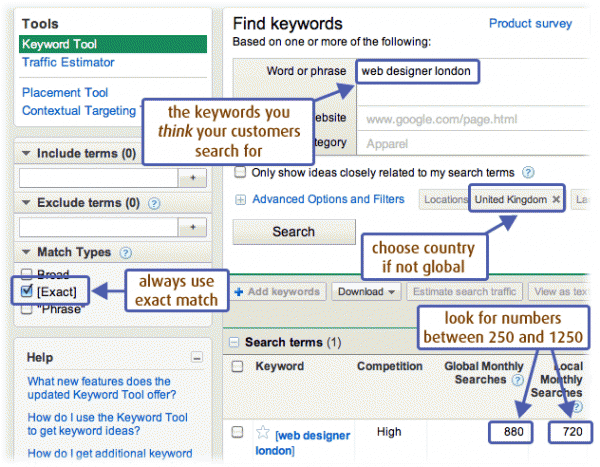3 step guide providing you with some insights to ensure you are on the right track when researching the keywords of choice. So, you have identified the content, now what?
Step 1: Selecting the Keywords
- Brainstorm list of ideas of words/phrases. Speak to your co-workers, friends, suppliers to your business of keywords and phrases they would associate to the content you are looking to create.
- Imagine you are the customer. Put yourself in the shoes of your customer. What types of keywords and phrases are you going to refer to? Phone or email your customers, be open with them and ask them for their thoughts and ideas too
- Competitors. This is a great resource tool. List out all your competitors who are selling the same product/service and begin to form research into the words and phrases they are targeting. Check out the source code of your competitors website products page - here you can search for Meta Keyword and Description tags where they may provide you with hints on keywords they are targeting.
- Analytics. Consult your analytics and make a note of all the relevant keywords users have used to arrive at your website relating to the specific product/service.
- Define your list. By now you should have a list of keywords and from this research you can now take it forward. Do not make the list too exhaustive, try to look to define and identify 10-15 keywords.
Step 2: Defining the List
- Relevant and Popular keywords. From the initial selection of keywords in Step 1, now you need to define the list of keywords you want to target that you see as relevant and popular for search tactics.
- Sign into the Google Keyword Tool which provides you with an insight into the search volume available for the range of keywords you have identified through Google e.g. how many searches are conducted on a monthly basis for that specific word or phrase.
- Copy and Paste the keyword list you created in Step 1 into the keyword tool and choose 'Exact match' and set the region you are looking to target.
- Record results. The Keyword tool will then generate a list of keyword search volume generated for a monthly average.
 |
Step 3: Choosing the Keywords
Analyse local monthly searches. If you log in to your Google account this will then break down the keywords by a monthly average figure and by region (Local) rather than Global. From here you can check to see peaks in search volume throughout the year.
Monitor Keyword ideas underneath the keywords you included, Google will also provide a keyword ideas section - this is a list of alternative and associated keywords you might also want to consider that to drive potential search volume.
Do the keywords match your content?This is an important step, make sure the keywords you are looking to take forward match the content you have on your website. There is no point identifying keywords with lots of potential search volume if you don't have the content available on the website to support this.
Hopefully, this provides you with an actionable 3 step guide to creating and defining a list of keywords for your SEO campaign, I would be keen to hear your thoughts and ideas you may use.